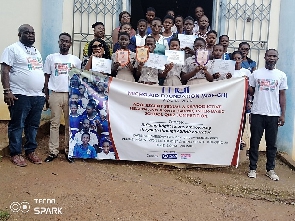The ASRHR Inter-basic school quiz competition, held on August 13, 2023, marked the conclusion of a six-month program aimed at promoting Adolescent Sexual and Reproductive Health and Rights (ASRHR) education among peer educators in the Efutu Sub-metro of Cape Coast Metropolitan Assembly.
This event saw active participation from five basic schools: Brabedzie M/A Basic School, Nyanisan M.A. Basic School, St. Cyprian's Anglican School, Mampong M.A. Basic School, and St. Peter's Anglican School. The program, funded by Plan International Ghana and the WVL-GHANA Project through Global Affairs Canada, aimed to empower young peer educators with ASRHR knowledge.
Program overview:
Evans Nii-Boye, the Project Coordinator, provided an overview of the program's objectives, implementation plan, and achievements over the past six months. The primary goal was to educate and engage youth on ASRHR topics.
Guest speakers:
Betty Vanderpuge, representing the Metro Director of Education for Cape Coast Metropolitan, stressed the importance of education and encouraged students to prioritize their studies.
Gloria Owusu-Ambrose from the University of Cape Coast's Guidance and Counseling Center emphasized the significance of abstaining from early sexual encounters and making informed choices.
Quiz competition results:
Following the quiz competition, the results were as follows:
Efutu Mampong M.A. Basic School secured first place with 55 points
Nyanisan M.A. Basic School achieved second place with 44 points
Brabedzie M.A. Basic School earned third place with 43 points
Recognition and prizes:
The top three schools received plaques and brand-new bags to recognize their accomplishments. Additionally, all participants received certificates of participation as a testament to their dedication to ASRHR education.
Program achievements:
Throughout the six-month program, several noteworthy achievements were accomplished:
Awareness outreach program: Educational initiatives were conducted in five selected basic schools to raise awareness of ASRHR.
Peer educator workshops: Twenty adolescents from the participating schools were trained as peer educators, enhancing their knowledge and communication skills on ASRHR topics.
Community advocacy activities: Outreach meetings and advocacy events effectively educated community opinion leaders and members on ASRHR through role-play and drama.
Health services linkage: The program facilitated connections between adolescents and healthcare service providers, improving access to quality, adolescent-friendly reproductive and sexual health services.
Conclusion:
The ASRHR Inter-basic school quiz competition and the associated program have been successful in advancing ASRHR education among young peer educators and their communities in the Efutu Sub-metro of the Cape Coast metropolitan assembly. The commitment of Plan International Ghana, WVL-GHANA Project, and Global Affairs Canada to this initiative has played a crucial role in raising awareness and fostering positive change in adolescent sexual and reproductive health and rights.
Regional News of Thursday, 14 September 2023
Source: Micro Aid Foundation













